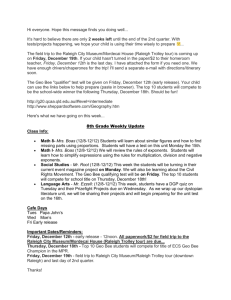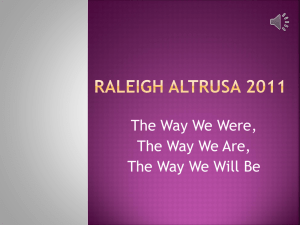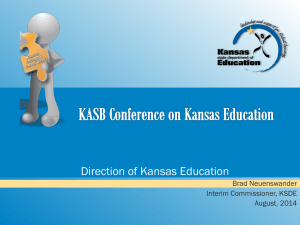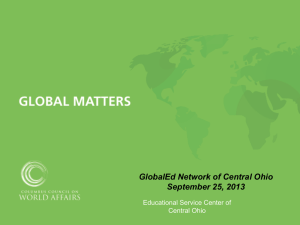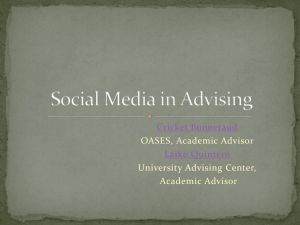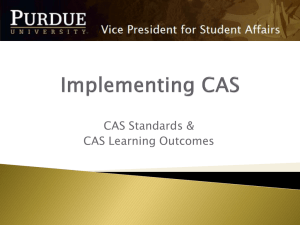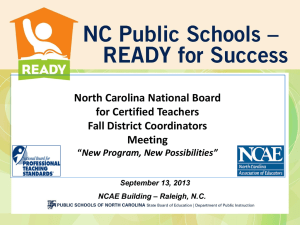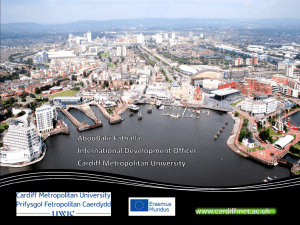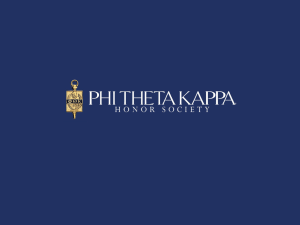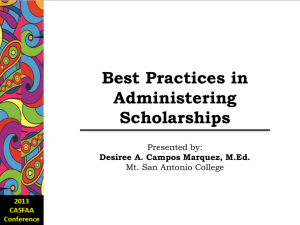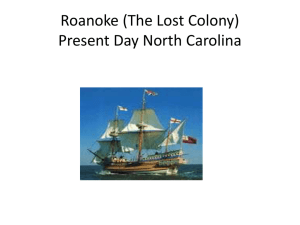The Raleigh Promise powerpoint presentation
advertisement
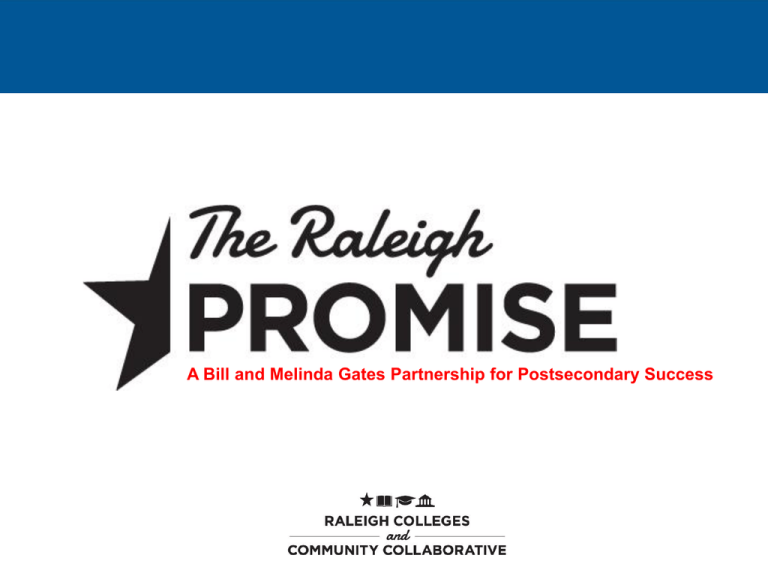
A Bill and Melinda Gates Partnership for Postsecondary Success Our Common Interest The future economic growth and prosperity of Raleigh and Wake County is dependent on an educated and skilled workforce. It is in our best interest, as a community, to increase the number of our citizens who achieve a post-secondary education and living-wage employment. A Bill and Melinda Gates Partnership for Postsecondary Success “A Powerful Community Partnership For Collective Impact” What is the RCCC? A group of key stakeholders, from different sectors, who are commitment to a common agenda for increasing the postsecondary success of our citizens. - centralized infrastructure - dedicated staff - structured processes - shared measurement - continuous communication - mutually reinforcing activities (Source: Collective Impact, Kania and Kramer, 2011) What Who’s is the at the RCCC table? ? Raleigh Colleges and Community Collaborative K-12 (WCPSS) Raleigh City Government Wake County Health and Human Services Faith-Based Organizations Non-profits Six Raleigh Colleges and Universities Community-based Organizations Corporations and Businesses Community leaders/members Southeast Raleigh Assembly, NC Wake County Human Services Raleigh Business and Technology Center The Fountain of Raleigh Fellowship 19 Vision “Every low-income youth in Wake County is a successful student, earns a postsecondary credential, and achieves living-wage employment ” 18 What is our Goal? Goal Double the number of low-income youth in Wake County who achieve a postsecondary credential and living wage employment. Current : 672 low-income college graduates per year 2025 Goal: 1344 low income graduates per year 13 What is the Talent Dividend? • Every 1% rise in the number of citizens with a post-secondary credential increases per capita income by $763 (CEOs for Cities, 2009) • By 2025, the Talent Dividend from the Raleigh Promise will be: $153,000,000 or 5:1 Return on Our Investment What Does the RCCC Do? Mission • Build and Sustain A High Capacity Community Collaborative for systemic change • And Effectively Execute The Raleigh Promise. 13 A High School Academic Success and College Preparation Strategy COLLEGE STUDENT MENTORING AND TUTORING ENROLL IN EARLY COLLEGE COURSES AGE 16 Low Income Student Cohort SAT/ACT PREP WORKPLACE INTERNSHIPS RALEIGH FUTURE SCHOLARS PROGRAM SCHOLARS SEMINAR/ CONFERENCE COACHING/ DEVELOPMENT COUNSELING TRANSITION TO COLLEGE FAMILY SERVICES - FINANCIAL LITERACY - COLLEGE APPLICATION -HR SERVICES - ESTABLISH AN IDA SATURDAY An Example: ACADEMY Low income Raleigh Residents with good potential (rising sophomores) apply or are nominated (Cohort size varies from year to year) IF STUDENT ENROLLS IN A RALEIGH COLLEGE WE GUARANTEE A FINANCIAL AID PACKAGE THAT MEETS 100 % OF THEIR DEMONSTRATED FINANCIAL NEED SAT/ACT FEES PAID SUMMER ACADEMIC CAMPS AT LOCAL COLLEGE FREE OR REDUCED FEES - COLLEGE APPLICATION ASSISTANCE - APPLICATION FEES PAID - COLLEGE OUTREACH AND INFORMATION PROVIDED - CAMPUS VISITS/ORIENTATIONS - COLLEGE TRANSITION WORKSHOPS - SUMMER ACADEMIC CAMP - EARLY SUMMER START PROGRAM AT LOCAL COLLEGES ENROLL IN ANY COLLEGE A College Retention and Graduation Success Strategy FIRST YEAR SEMINAR/ ORIENTATION FACULTY OR STAFF MENTOR COLLEGE STUDENT MENTORING AND TUTORING FIRST YEAR STUDENT SUCCESS SCHOLARS SEMINAR/ CONFERENCE ALL RALEIGH SCHOLARS WILL: - ATTEND JOB FAIRS - JOB SEARCH/PLACEMENT SERVICES - RESUME/INTERVIEW TRNG - GRADUATE SCHOOL ADVISING/INFORMATION ASSIGNED TO A LIVING AND LEARNING COMMUNITY ENGAGED IN UNDERGRADUATE RESEARCH 2ND - 4TH YEAR OF COLLEGE WRITING INTENSIVE COURSEWORK ACADEMIC PROGRESS MONITORING “INTRUSIVE” ADVISING WORK STUDY - CONTINUE TARGETED FIRST YEAR STUDENT SUCCESS ACTIVITIES - ENGAGE IN CAMPUS/COMMUNITY SERVICE - WORKPLACE INTERNSHIP - STUDY ABROAD/ALTERNATIVE SPRING BREAK TRANSITION TO EMPLOYMENT EMPLOYMENT/ GRADUATE SCHOOL A community-based strategy for increasing college access and completion. Preparation • Educational CBA • Tutoring • Advising • Holistic Family Approach • Coaches Assigned • College Matters Campaign • Financial Aid Counseling • Dual Enrollment Courses • Diagnostic Testing Connection College Entry Raleigh College Center Progress Employment • Career Advising • Job Link Placement • Degree Job Placement • Career Fairs • Interview Training • Resume Assistance • Guaranteed Interviews College Completion • Stackable Credentials • Technical Education Certificates/Diplomas • Articulation Agreements • People Skills Courses • Remedial Education • Intrusive Advising • Financial Aid • Application Assistance • Academic Services • Student Tracking • Gatekeeper Courses Monitored • Tech Pathway Progress • Financial Aid • Transfer Coursework Credit • Coops and Internships Education Pipeline Strategy 16 years old High School 26 years old Transition to College College Retention Employmen t Low-income students in Wake County will: - Be Prepared for post-secondary education Be Supported inside and outside school Succeed academically Enroll and succeed in some form of postsecondary credentialing program - Graduate and are employed How You Can Help? • Become an RCCC partner organization and join the Raleigh Promise. • Join our Business and Education Advisory Council (BEAC) • Provide our Raleigh Fellows Paid Internships, then Jobs Upon Graduation • Invest funds in the Raleigh Promise programs and education pipeline Learn More About The Raleigh Promise • Contact: Jose Picart, Executive Director japicart@ncsu.edu or 919 513-0388 Carol Cutler-White, Associate Director ccwhite@waketech.edu or 919 335-1201 • Visit Our Website: www.raleighpromise.org A Bill and Melinda Gates Partnership for Postsecondary Success QUESTIONS/COMMENTS? Please visit www.raleighpromise.org How Do We Build Capacity? Effective Organizational Structure Leadership Team Business and Education Advisory Council (BEAC)* • Representatives from Business and Education Community • Advise Steering Committee and Leadership Team • Provide business and employer perspective • Advocacy and Fundraising • Help promote systemic change *under development with Raleigh Chamber Of Commerce. • • • • Manage Staff Enhance networks Direct and Guide Steering Cmte Oversee project assessment and accountability • Fiscal management • Represent the Partnership • Work with BEAC Steering Committee 9 Action Teams Staff • Project Management • Coordinate Budget • Coordinate Work Plans • Coordinate meetings, networks and Forums • Develop and maintain websites, documents and archives. • Membership of All Partners • Provide Direction, Oversight and Decision-Making • Advise Leadership Team • Review Work Plans and Metrics • Accountability Cross Sector Leaders At Culture of Engaged Local Supportive Partnership All Levels Evidence Communities SIX ESSENTIAL CAPACITIESPolicy Environ • Leadership • Data, Metrics and Accountability • Coaching • Partners, Grants and Fundraising • Communication • Work-based Learning • Raleigh Scholars • Raleigh Fellows • Raleigh Centers Sustainable Resources20 Early Success Program Implementation • Raleigh Fellows Programs active on all six university campuses (23,000 + students). • Pilot Future Scholars Program implemented in four Wake County Public Schools (Mary Phillips, Garner, Millbrook, and Sanderson). 77 students and 96% retention rate) • First Raleigh College Center was dedicated on Jan 30, 2012 in the Chavis Community Center (Two college prep classes every month) Early Success Sustainability • $1. 3 Million (Bill and Melinda Gates Foundation) • $16,450 ADVANCE Americorps grant • $10,000 CEO's for Cities Talent Dividend Grant • $10,000 grant from the City of Raleigh • $174,000 Drop-Out Prevention Grant • $300,000 “Impact Raleigh” Scholarships (Meredith College) • $48,900 VISTA Grant (NC Campus Compact)
